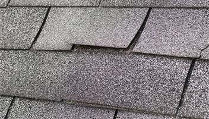Use Eric Lexi's expertise when filing an insurance claim.
While no guarantee can ever be made about what determination an insurance provider will come to when assessing damage to your roof or other properties, It is prudent to have someone there representing your intrest aas the homeowner with industry knowledge, expertise, and a matery of the industry lingo.
Roofing insurance claims can be complicated. Check the fine print on your homeowner's insurance policy before a storm or disaster damages your roof.
Know the Policy Exclusions
Insurance companies often exclude certain items and repairs from coverage to protect themselves from fraud. For instance, your roof insurance won't cover you whacking your roof in with a sledgehammer to claim the insurance money.
But exclusions aren't always that cut and dry, as each insurance provider covers roof damage differently. Check your policy to find out if yours has any of these common exclusions:
Improper maintenance: Insurance companies will often inspect the damage detailed in your claim. If your provider determines that the damage was due to improper roof maintenance, you’ll be responsible for the replacement costs.
Materials: Some insurance policies won't cover certain roofing materials, such as slate, recycled shakes or other "green" materials because of the extra maintenance costs. Make sure to check your policy before installing a new roof to ensure the cost will be covered.
Old roof: Because it's impractical for insurance companies to cover a roof that’s nearing the time for replacement, many won't cover roofs more than 20 years old or so.
If your insurance company has a restriction on your roof’s age, it's important to understand how a roof’s age is defined. While many homeowners will put new shingles over old, many insurance companies don't view this as a new roof. They calculate a roof’s age from the bottom layer of shingles.
Also, most insurers won't insure a roof with more than two layers of roofing material.
Repair vs. full replacement: In some cases, homeowners insurance will cover only roof repairs but not a complete replacement. Typically, insurance covers repairs, such as shingles missing after a storm. But if the damage means you need to replace the entire roof, your policy might not foot the whole bill.
How can you the Homeowner be proactive in protecting your home through insurance?
You may be tempted to sign a contract or a letter of intent to get on a roofer's schedule and avoid delays before your claim is settled. If you do, include a clause that the work is contingent on payment from the insurance company or whatever financing you are trying to get. Eric Lexi's agreement with the Homeowner clearly states the Agreement between Eric Lexi LLC and the Homeowner is CONTINGENT on payment from the Insurance Company. In other words, if the Insurance doesn't pay then you the Homeowner doesn't owe a red cent... we part as friends.



